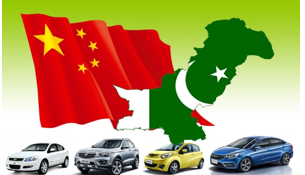i INP-WEALTHPK
Azeem Ahmed Khan
The demand for Chinese-made electric vehicles (EVs) is on the rise in Pakistan, driven by the high cost of imported fossil fuels, a growing trade deficit, and environmental concerns, said Eng Ahad Nazir, Associate Research Fellow and Head Centre for Private Engagement, Sustainable Development Policy Institute.

“The growing popularity of Chinese electric vehicles in Pakistan marks a major step toward establishing a domestic EV industry, reducing its trade deficit by importing fewer petroleum products, and aligning itself with global trends toward sustainability and cleaner energy solutions,” he told WealthPK.
“This partnership between the two countries holds great potential for driving economic growth, protecting the environment, and serving as an example for other developing nations seeking to adopt cleaner energy alternatives,” he said. “Furthermore, the partnership has the potential to make Pakistan a regional hub for EV manufacturing and innovation,” Nazir said.
“Joint research and development initiatives between the two countries could focus on energy-efficient battery systems, localised vehicle designs, and smart mobility solutions suited to Pakistan’s unique geography and climate,” he added. Over the past few years, Nazir said this partnership has made significant progress in areas such as vehicle assembly, battery production, and EV infrastructure development.
“Key players like BYD and other Chinese companies have entered the Pakistani market through joint ventures, helping to build local capabilities while meeting rising demand for clean transportation,” he added. For example, Nazir said BYD has partnered with Mega Motors to establish EV assembly plants in Pakistan, with a target to begin operations by 2026 and set up a nationwide network of fast-charging stations along motorways and urban centres.
“This joint venture seeks to establish assembly plants for electric buses and cars in Pakistan, aiming to lower the cost of EVs in the local market and create a self-sustaining electric vehicle manufacturing ecosystem,” he added. He said these developments are based on the Pakistani government’s 2020 National Electric Vehicle Policy, which aims to reduce dependence on imported fuel and cut greenhouse gas emissions.
“The policy includes incentives like tax breaks, subsidies, and road tax exemptions for EV buyers and manufacturers, while it also sets an ambitious goal of achieving 30% EV penetration in the country’s vehicle fleet by 2030,” he added. Nazir said Chinese investments are playing a critical role in this transformation.
“Companies like ADM Group have committed over $300 million to Pakistan’s EV sector, including the deployment of more than 3,000 charging stations and the construction of a $250 million large-scale manufacturing facility,” he added.
Many Chinese firms have also introduced electric scooters with swappable battery systems, while brands like Yadea and Road Prince have launched multiple models of electric scooters tailored to diverse consumer needs. “Meanwhile, the Crown Group – in collaboration with China's Benling (an electrical vehicles manufacturer) and Dongjin (a battery producer) – has set up a facility near Karachi to produce electric two- and three-wheelers, integrating battery and vehicle assembly,” he said.
“These efforts are creating jobs, enabling technology transfer, and fostering innovation in Pakistan’s growing EV ecosystem,” he added. “Despite the momentum, several challenges remain,” he observed. “The lack of a consistent regulatory framework, limited charging infrastructure, and high upfront costs of EVs continue to hinder widespread adoption,” he added.
“Targeted policy support and sustained public-private investment are essential to fully unlock the potential of the Pak-China EV partnership,” he said. “China’s dominance in the global EV market, especially in battery production, is another key factor driving the success of this collaboration,” he noted. “Chinese companies like Contemporary Amperex Technology Co.
Limited currently hold over 30% of the global lithium-ion battery market share, providing high-performance battery solutions that power many of the EVs entering the Pakistani market,” he added. “China's extensive experience in deploying over 2.8 million EV charging stations worldwide has also proven valuable, as Pakistan looks to replicate similar infrastructure,” he pointed out.
In addition to economic benefits, Nazir said the environmental impact of this transition is significant because EVs offer a cleaner alternative to traditional vehicles by producing zero tailpipe emissions. “With cities like Karachi and Lahore battling severe air pollution, the shift to electric mobility could help reduce health risks and improve quality of life,” he added.
“Pakistan's environmental efforts align with its commitment under the Paris Agreement, which includes reducing emissions by 50% by 2030 – largely through the transformation of the transport sector,” he said.
Credit: INP-WealthPk









